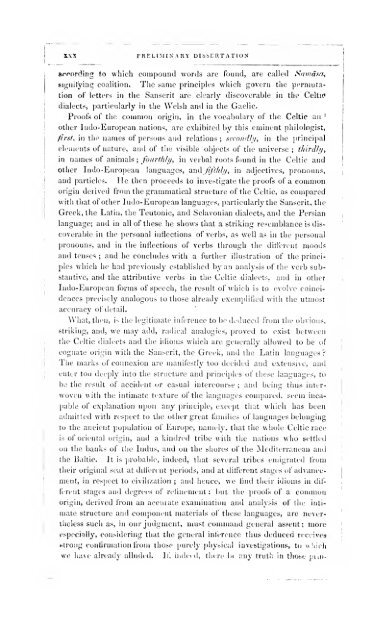A history of the Highlands and of the Highland clans : with an ...
A history of the Highlands and of the Highland clans : with an ...
A history of the Highlands and of the Highland clans : with an ...
Create successful ePaper yourself
Turn your PDF publications into a flip-book with our unique Google optimized e-Paper software.
XXX PRELIMINARY DISSERTATION<br />
arpording to which compound words are found, are called Samdna,<br />
signitying coalition. The same principles which govern <strong>the</strong> permuta-<br />
tion <strong>of</strong> letters in <strong>the</strong> S<strong>an</strong>scrit are clearly discoverable in <strong>the</strong> Celtio<br />
dialects, particulai-ly in <strong>the</strong> Welsh <strong><strong>an</strong>d</strong> in <strong>the</strong> Gaelic.<br />
Pro<strong>of</strong>s <strong>of</strong> <strong>the</strong> common origin, in <strong>the</strong> vocabulary <strong>of</strong> <strong>the</strong> Celtic <strong>an</strong> '<br />
o<strong>the</strong>r Indo-Europe<strong>an</strong> nations, are exhibited by this eminent philologist,<br />
first, in <strong>the</strong> names <strong>of</strong> persons <strong><strong>an</strong>d</strong> relations ; secondli/, in <strong>the</strong> principal<br />
elements <strong>of</strong> nature, <strong><strong>an</strong>d</strong> <strong>of</strong> <strong>the</strong> visible objects <strong>of</strong> <strong>the</strong> universe ; thirdly,<br />
in names <strong>of</strong> <strong>an</strong>imals ; fourthly, in verbal ro<strong>of</strong>s found in <strong>the</strong> Celtic <strong><strong>an</strong>d</strong><br />
o<strong>the</strong>r Indo-Europe<strong>an</strong> l<strong>an</strong>guages, <strong><strong>an</strong>d</strong> fifthly, in adjectives, pronouns,<br />
<strong><strong>an</strong>d</strong> particles. He <strong>the</strong>n proceeds to investigate <strong>the</strong> pro<strong>of</strong>s <strong>of</strong> a common<br />
origin derived from <strong>the</strong> grammatical structure <strong>of</strong> <strong>the</strong> Celtic, as compared<br />
<strong>with</strong> that <strong>of</strong> o<strong>the</strong>r Indo-Europe<strong>an</strong> l<strong>an</strong>guages, particularly <strong>the</strong> S<strong>an</strong>scrit, <strong>the</strong><br />
Greek, <strong>the</strong> Latin, <strong>the</strong> Teutonic, <strong><strong>an</strong>d</strong> Sclavoni<strong>an</strong> dialects, <strong><strong>an</strong>d</strong> <strong>the</strong> Persi<strong>an</strong><br />
l<strong>an</strong>guage; <strong><strong>an</strong>d</strong> in all <strong>of</strong> <strong>the</strong>se he shows that a striking resembl<strong>an</strong>ce is dis-<br />
coverable in <strong>the</strong> personal inflections <strong>of</strong> verbs, as well as in <strong>the</strong> personal<br />
pronouns, <strong><strong>an</strong>d</strong> in <strong>the</strong> inflections <strong>of</strong> verbs through <strong>the</strong> difl'erent moods<br />
<strong><strong>an</strong>d</strong> tenser ; <strong><strong>an</strong>d</strong> he concludes <strong>with</strong> a fur<strong>the</strong>r illustration <strong>of</strong> <strong>the</strong> princi-<br />
ples which he had previously established by <strong>an</strong> <strong>an</strong>alysis <strong>of</strong> <strong>the</strong> verb sub-<br />
st<strong>an</strong>tive, <strong><strong>an</strong>d</strong> <strong>the</strong> attributive verbs in tlie Celtic dialects, <strong><strong>an</strong>d</strong> in o<strong>the</strong>r<br />
Indo-Europe<strong>an</strong> forms <strong>of</strong> speech, <strong>the</strong> result <strong>of</strong> which is to evolve coinci-<br />
dences precisely <strong>an</strong>alogous to those already exemplified <strong>with</strong> <strong>the</strong> utmost<br />
accuracy <strong>of</strong> detail.<br />
What, <strong>the</strong>n, is <strong>the</strong> legitimate inference to be deduced from <strong>the</strong> obvious,<br />
striking, <strong><strong>an</strong>d</strong>, we may add, radical <strong>an</strong>alogies, proved to exist between<br />
<strong>the</strong> Celtic dialects <strong><strong>an</strong>d</strong> <strong>the</strong> idioms which are generally allowed to be <strong>of</strong><br />
cognate origin <strong>with</strong> <strong>the</strong> S<strong>an</strong>scrit, <strong>the</strong> Greek, <strong><strong>an</strong>d</strong> <strong>the</strong> Latin l<strong>an</strong>guages ?<br />
The marks <strong>of</strong> connexion are m<strong>an</strong>ifestly too decided <strong><strong>an</strong>d</strong> extensive, <strong><strong>an</strong>d</strong><br />
enter too deeply into <strong>the</strong> structure <strong><strong>an</strong>d</strong> principles <strong>of</strong> <strong>the</strong>se l<strong>an</strong>guages, to<br />
be <strong>the</strong> result <strong>of</strong> accident or casual intercourse ; <strong><strong>an</strong>d</strong> being thus interwoven<br />
witli <strong>the</strong> intimate texture <strong>of</strong> <strong>the</strong> l<strong>an</strong>guages compared, seem inca-<br />
pable <strong>of</strong> expl<strong>an</strong>ation upon <strong>an</strong>y principle, except tliat which has been<br />
admitted <strong>with</strong> respect to <strong>the</strong> o<strong>the</strong>r great families <strong>of</strong> l<strong>an</strong>guages belonging<br />
to <strong>the</strong> <strong>an</strong>cient population <strong>of</strong> Europe, namely, that <strong>the</strong> whole Celtic race<br />
is <strong>of</strong> oriental origin, <strong><strong>an</strong>d</strong> a kindred tribe <strong>with</strong> <strong>the</strong> nations who settled<br />
on <strong>the</strong> b<strong>an</strong>ks <strong>of</strong> <strong>the</strong> Indus, <strong><strong>an</strong>d</strong> on <strong>the</strong> shores <strong>of</strong> <strong>the</strong> Mediterr<strong>an</strong>e<strong>an</strong> <strong><strong>an</strong>d</strong><br />
<strong>the</strong> Baltic. It is probable, indeed, that several tribes emigrated from<br />
<strong>the</strong>ir original seat at diH'erent periods, <strong><strong>an</strong>d</strong> at different stages <strong>of</strong> adv<strong>an</strong>ce-<br />
ment, in respect to civilization ; <strong><strong>an</strong>d</strong> hence, we find <strong>the</strong>ir idioms in different<br />
stages <strong><strong>an</strong>d</strong> degrees <strong>of</strong> refinement : but <strong>the</strong> pro<strong>of</strong>'s <strong>of</strong> a common<br />
origin, derived from <strong>an</strong> accurate examination <strong><strong>an</strong>d</strong> <strong>an</strong>alysis <strong>of</strong> <strong>the</strong> inti-<br />
mate structure <strong><strong>an</strong>d</strong> component materials <strong>of</strong> <strong>the</strong>se l<strong>an</strong>guages, are never<strong>the</strong>less<br />
such as, in our judgment, must comm<strong><strong>an</strong>d</strong> general assent; more<br />
especially, considering that <strong>the</strong> general inference thus deduced receives<br />
Dtrou{{ confirmation from those purely |)hysical investigations, to w.'iich<br />
we ha\e already alluded. If, iiiderd, <strong>the</strong>re be <strong>an</strong>y truth in thosi; pi in-

















